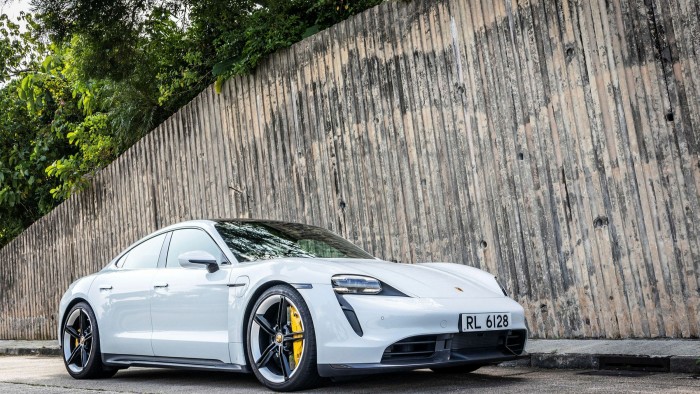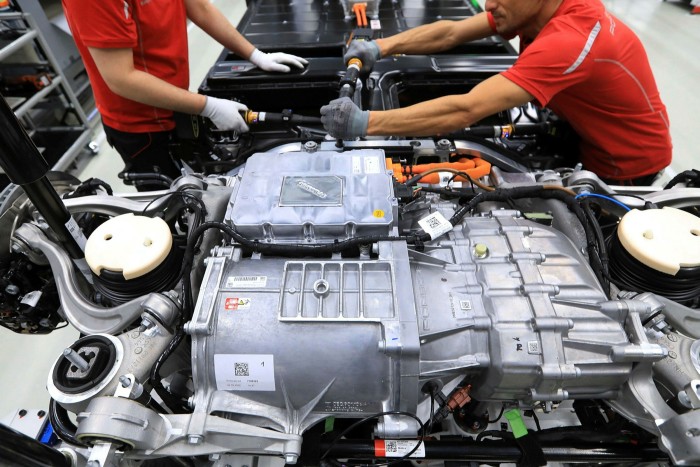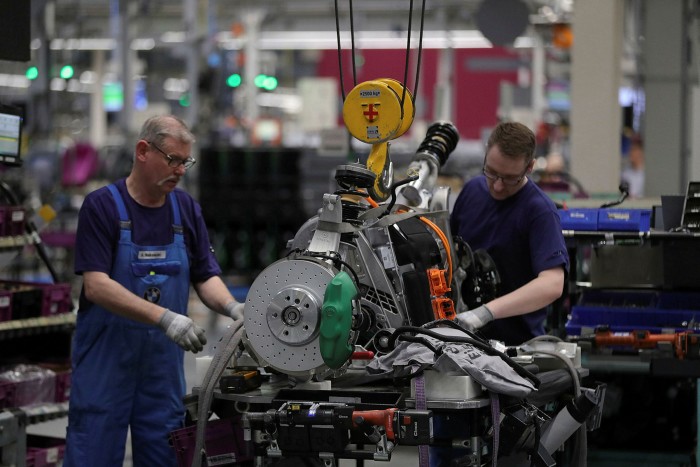Carmakers embrace greener vision in wake of Dieselgate

Simply sign up to the Automobiles myFT Digest -- delivered directly to your inbox.
As Niagara Falls thundered in the background, a gleaming white Porsche Taycan swept silently on to the stage.
At the exact same moment, an identical sister vehicle rode on to a platform beside a German field that boasted 600,000 solar panels.
A model in China did the same, backed by a night-time vista of illuminated wind turbines.
This co-ordinated, ostentatious 2019 unveiling ceremony for the battery sports car was supposed to send a message: Porsche, a brand more naturally associated with petrolheads than tree-huggers, was serious about going green.
Three years later, and its eco-drive seems to have gained traction.
Not only does the Taycan today outsell Porsche’s flagship 911, but also the company as a whole managed to cut its Scope 1 and 2 greenhouse gas emissions — respectively, from its own operations and from the energy it buys — by 81 per cent between 2015 and 2020.
That is more than any other carmaker in the FT’s Europe’s Climate Leaders 2022 list, which comprises companies that have significantly reduced their GHG emissions intensity — that is, emissions relative to their revenue.
The next carmaker down is Audi, whose absolute Scope 1 and 2 emissions fell by 64.5 per cent.
The two businesses have something in common: both are owned by Volkswagen, the German titan that has sought to reinvent itself as an electric pioneer after being sullied by the “Dieselgate” pollution affair.

The 2015 scandal broke when VW, Audi and Porsche models were found to have used software that deceived regulators about true emissions of harmful nitrogen oxide gases from diesel engines.
The long-term reaction of VW, under the leadership of former BMW executive Herbert Diess, has been one of the largest attempted reputational resuscitations in the annals of corporate history.
The upshot is that VW is pouring €52bn into electric cars, and shifting its factories to green energy.
“The diesel crisis really gave us this: think about yourself, what is your purpose,” VW’s chief strategy officer Andreas Walingen said last year. “We started this four, five years ago when we had the discussion, what are the next steps for Volkswagen’s strategy, where are we going as a company with our customers?”
Julia Poliscanova, a senior director at campaign group Transport & Environment, says the company “has completely reinvented itself, and they approach things really differently now”.
She adds: “It proves you should never waste a good scandal.”
VW’s newfound environmental fervour is shared by others in the sector. Carmakers BMW, Mercedes-Benz, Volvo and Renault also feature on the Climate Leaders list.
Cutting emissions from the back of the vehicle is “only one piece of the equation”, explains BMW sustainability head Thomas Becker.
“If you want to achieve the Paris Agreement objectives [of keeping global warming to no more than 1.5C above pre-industrial levels] you need to go beyond just offering a broader supply of electric drive trains,” Becker says.
“With electric cars, the focus of total CO2 footprint shifts from the use case into the supply chain. EVs can easily have twice the footprint in its parts as an ICE [internal combustion engine].” Extracting the minerals needed for batteries, for example, creates significant emissions.

Becker adds that there is likely to be more CO2 emitted from supply chains than from vehicles themselves by 2030, notwithstanding that the forecasts by BMW for the uptake of electric vehicles are some of the lowest in the industry.
Some industry experts argue that smaller companies have advantages over their larger competitors, which have a broader spread of factories and suppliers and so find it harder to make comparable emissions cuts.
“It’s easier [for a small car brand] to get the supply chain carbon neutralised by 2030 than a larger brand,” says Adrian Hallmark, chief executive of Bentley, which is also owned by VW. “Suppliers need to buy renewable energy, that means you need a huge programme that goes right down to the lowest level. It will take years to get there, and needs a relentless drive.”
More stories from this report
Europe’s Climate Leaders 2022: interactive listing
Tech manufacturers wrestle with supply chain emissions
ISSB sets out to tighten up climate reporting
Race to cut carbon emissions fuels climate tech boom
New SBTi boss takes over as criticisms mount
The carbon offset market is falling short. Here’s how to fix it
And, although VW’s group-wide efforts to cut its Scope 1 and 2 emissions intensity have earned it a separate place on the Climate Leaders list, in absolute terms it remains a big emitter. The carmaker’s overall emissions intensity fell by 5.8 per cent between 2015 and 2020, according to the survey — the same as another German company, warehouse operator Jungheinrich. Yet, while Jungheinrich emitted 53,000 tonnes of CO2-equivalent in 2020, VW pumped out 7.1mn tonnes.
Environmental groups also question whether businesses that mass-produce heavy metal vehicles for purchase by individual households can ever really be counted as sustainable.
“We are always conscious that it’s not necessary to replace one type of vehicle with another type of vehicle, but [instead is about considering] the most sustainable way to set up transportation, asking what mode do you need at which point,” says Sandra Roling, head of transport at the Climate Group, an NGO. “We need vehicles to get as close as possible to zero emissions,” she adds.
At least some parts of the industry appear to be of the same mind. “Can you imagine describing this to a child today? Thirty years from now, cars will still produce toxic gases, making the air harsher to breathe?” wonders Polestar boss Thomas Ingenlath.
The Volvo-backed electric car brand wants to produce a vehicle that is truly zero-emission by the end of the decade. Even its current model, the Polestar 2, has generated around 26 tonnes of CO2 before it leaves the factory gate. Ingenlath says: “Building and selling electric cars isn’t the end point, it is the beginning.”
Climate Capital

Where climate change meets business, markets and politics. Explore the FT’s coverage here.
Are you curious about the FT’s environmental sustainability commitments? Find out more about our science-based targets here
Comments